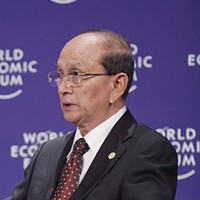Since assuming power in early 2011, Myanmar’s government, led by President Thein Sein, has focused its energies on the domestic agenda: rejuvenating the economy, liberalizing the political system and bringing an end to the decades-long ethnic conflicts along the country’s periphery. In tandem with these reforms, however, Naypyidaw has also endeavored to rebalance its foreign relations, with a particular emphasis on improving ties with the United States and members of the European Union, as well as important Asian neighbors such as Japan and India.
China, which forged a close economic and political relationship with Myanmar during the 1990s and 2000s -- a period in which it was virtually shunned by the West due to its harsh treatment of opponents of the military regime -- has watched the U.S.-Myanmar rapprochement closely, and no doubt with some nervousness.
Yet China is probably not overly concerned about its position in the hierarchy of Myanmar’s foreign relations, for three main reasons. First, its two-decade economic primacy there will be hard to erode. Second, Naypyidaw will always put a premium on cordial relations with Beijing given the two countries’ geographical contiguity. And third, the obstacles to a close relationship between the U.S. and Myanmar, while not insurmountable, are still significant.

